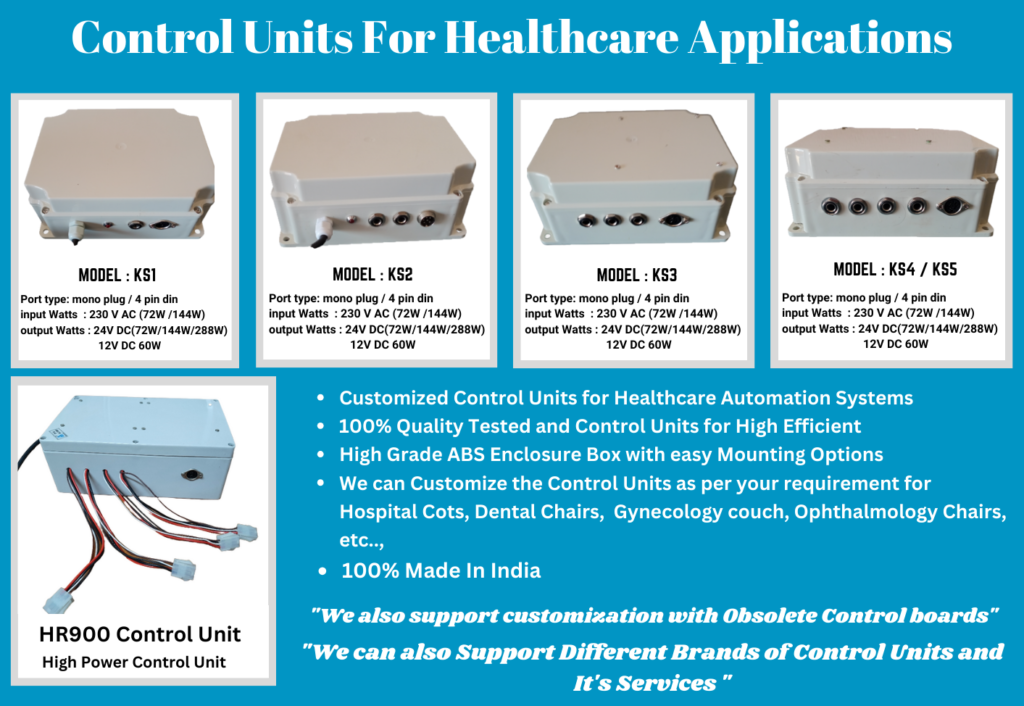Introduction: In the ever-evolving landscape of healthcare, technology plays a pivotal role in enhancing patient care, improving efficiency, and increasing accuracy in diagnosis and treatment. One crucial component of this technological revolution is the control unit, a central hub that manages and coordinates various medical devices and systems. In this blog, we will delve into the world of control units for healthcare, exploring their significance, applications, and the advancements that are shaping the future of medicine.
The Significance of Control Units in Healthcare
Control units in healthcare serve as the brains behind a wide range of medical equipment, including imaging machines, diagnostic tools, and patient monitoring systems. These control units are designed to:
- Streamline Workflow: Control units help healthcare professionals streamline their workflow by providing a centralized platform to monitor and control multiple devices simultaneously. This eliminates the need for manual adjustments and allows for a more efficient and accurate patient care process.
- Ensure Data Integration: In modern healthcare, data is king. Control units facilitate the seamless integration of data from various devices, such as MRI machines, ECG monitors, and infusion pumps. This integrated data is crucial for accurate diagnosis and treatment decisions.
- Enhance Patient Safety: Control units play a vital role in enhancing patient safety by setting limits and alarms on medical equipment. For example, they can ensure that a patient’s vital signs stay within safe parameters or that medication dosages are administered correctly.
- Remote Monitoring: With the advent of telemedicine, control units enable healthcare providers to remotely monitor patients’ conditions and adjust treatment plans as necessary. This capability has been especially valuable during the COVID-19 pandemic.

Applications of Control Units in Healthcare
Control units find applications in a wide range of medical settings and devices, including:
- Imaging Systems: Control units are integral to MRI, CT, and X-ray machines, controlling the scanning process, image acquisition, and image quality adjustments.
- Patient Monitors: In intensive care units and operating rooms, control units are used to monitor vital signs like heart rate, blood pressure, and oxygen levels.
- Infusion Pumps: Control units regulate the administration of medications and fluids, ensuring precise dosing and minimizing the risk of errors.
- Ventilators: Control units in ventilators help adjust parameters like breathing rate and pressure to match a patient’s needs.
- Laboratory Equipment: In laboratories, control units manage automated analyzers, ensuring precise and consistent results in diagnostics.
Advancements in Control Unit Technology
The field of control units for healthcare is rapidly evolving, thanks to technological advancements such as:
- Artificial Intelligence (AI): AI algorithms are increasingly integrated into control units to assist in diagnosis, predict patient outcomes, and optimize treatment plans.
- Wireless Connectivity: Control units now often feature wireless connectivity, enabling real-time data transfer and remote monitoring, which is especially valuable for home healthcare.
- Interoperability: Standardized communication protocols are improving interoperability between different medical devices, allowing for better data exchange and coordination.
- Cybersecurity: As control units become more interconnected, ensuring the security of patient data and device functionality has become a top priority. Advanced cybersecurity measures are continuously developed to protect against threats.
Conclusion
Control units are the unsung heroes of modern healthcare, serving as the central nervous system that orchestrates the intricate dance of medical devices and data. Their role in streamlining workflow, enhancing patient safety, and enabling remote care is undeniable. As technology continues to advance, we can expect control units to play an even more significant role in shaping the future of healthcare, improving patient outcomes, and making healthcare delivery more efficient and accessible for all.
